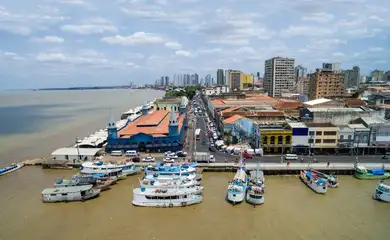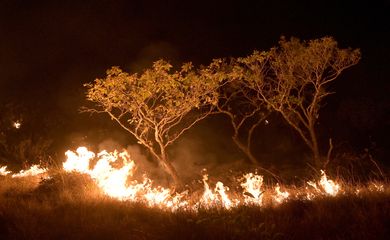Amazon entrepreneurs gear up for COP30

With less than a year to go until the 30th United Nations Climate Change Conference (COP30) takes place (Nov. 10–21), Belém, the host city, is undergoing a revamp of its infrastructure and services. And in addition to its streets, buildings, and squares, micro and small entrepreneurs are also preparing to welcome visitors and offer the best of Amazon hospitality.

New technologies, bio-jewelry, and innovative decorative items using Amazon raw materials are expected to be presented to visitors arriving in the state of Pará for the conference.
The Brazilian government is likely to receive some 100 thousand visitors over the two weeks of the conference—including heads of state, participants, and tourists. In 2024, Baku, in Azerbaijan, had welcomed 54,148 in-person participants, including delegations, observers, guests, and support staff.
As it stands today, Belém has 18 thousand hotel beds and should increase this number to 22 thousand in the coming months with the inauguration of new facilities. The extraordinary secretary for COP30, Valter Correia, said on EBC radio broadcast Voz do Brasil that, in addition to the initiatives by the state business community, the federal government will guarantee the construction of 500 five-star modular apartments, as well as the availability of two ships used for international cruises with the capacity to accommodate up to 5 thousand.
The number of lodging units in residences and vacation rentals on Brazil’s most popular apps is also growing each day. These are accommodations already used by visitors for festivities like the Círio de Nazaré, when the city gathers thousands of tourists from the state itself and other Brazilian cities. In 2023, 80,500 tourists came during the religious festival, as per official data.
Training
The Brazilian Micro and Small Business Support Service (Sebrae) signed a partnership with one of the apps to train the owners of these accommodations and, in 2024 alone, the number of hosts on the platform is said to have risen from 700 to 3,500. “Expectations are as high as they can be, not just for November, but also before and after the event. Roughly speaking, tourism in our state has already surged since the announcement that the conference would be held here,” said Rubens Magno, managing director of Sebrae in Pará.
In 2024, Magno went on to note, Sebrae provided 18 thousand consultations to hospitality, food and beverage, mobility, and creative economy companies interested in preparing for COP30. “Companies come to us looking for guidance on issues such as financial management, pricing, and stock and customer service, targeting the increase in demand that has already reached their businesses with the visibility brought by the UN conference,” he stated.
Innovation
One of these companies is owned by designer Nilma Arraes, who produces bio-jewelry and original objects with environmental responsibility. The businesswoman, who has completed a number of training courses and also works as a Sebrae consultant, has been innovating by reusing materials abundantly discarded in the region. “The focus of my product has always had everything to do with COP, because I work on sustainability and social issues, not to mention the environment. My work is focused on not using material that will be destroyed, but on reusing what would otherwise go to waste,” she explained.
To build upon this idea, Arraes developed a raw material called “maria,” a mixture of açaí with resin and supplies from the Amazon, which she uses to make bio-jewelry and other accessories. For COP30, she launched a line of lamps called Luz de Rios (“Riverlight”), made from the scales of the pirapema fish, common on the coast of Pará and in local cuisine.
Fashion designer Val Valadares has gone one step further and partnered with another company in the state, responsible for starting a new rubber cycle in the Amazon, and together they have launched an entire fashion collection made from latex. “We’re looking into turning our rubber into a kind of leather from Pará that’s never been used in fashion before, making exclusive pieces, not in large amounts, but exclusive for artists, for those who like to wear something different. I’m currently working on the possibility of making a fully sustainable lining, so there’s no need for any product that isn’t sustainable,” she said.
The partner company works with 1,570 rubber tapping families on the island of Marajó, using social tools for selling latex bio-jewellery produced by rubber tappers’ wives and providing raw materials for footwear.
A voice of their own
The entrepreneurs are also hoping to have their own voice heard at COP30. Valadares said that, as well as raising the standard of dressmaking in the Amazon, she dreams of opening a school atelier, to boost the revenue of a brand she started in the Jacundaí Quilombola community, in the municipality of Moju, which has already reached the catwalks of Milan Fashion Week.
“I hope to be able to showcase my talent and the knowledge I’ve acquired over all these years of work. I also plan to promote and contribute to fashion, not just at COP30, so that our state is given a new face, and becomes known not only for its cuisine, but also for its involvement in fashion,” she said.
Nilma Arraes also has plans to expand her business and engage even more people in the production chain of her bio-jewelry creations. “I’m joined by six people who work as goldsmiths, as well as buying the scales from a fish supplier, but I’ve already worked with other professionals who have helped me at different times,” she recounted.




Dê sua opinião sobre a qualidade do conteúdo que você acessou.
Escolha sua manifestação em apenas um clique.
Você será direcionado(a) para o sistema Fala.BR, mas é com a EBC que estará dialogando. O Fala.BR é uma plataforma de comunicação da sociedade com a administração pública, por meio das Ouvidorias.
Sua opinião ajuda a EBC a melhorar os serviços e conteúdos ofertados ao cidadão. Por isso, não se esqueça de incluir na sua mensagem o link do conteúdo alvo de sua manifestação.
Clique aqui para mais informações sobre a Ouvidoria da EBC.










